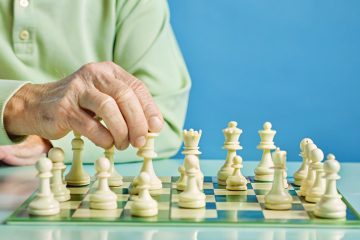Unlocking Mental Relaxation: How Playing Chess Calms the Mind
In today’s fast-paced world, finding effective ways to relax and rejuvenate the mind is more important than ever. While many turn to activities like yoga or meditation, a surprising contender offers similar benefits: chess. Often seen as a game of strategy and intellect, chess is also a powerful tool for mental well-being. The focus required to playing chess calms the mind by shifting attention away from everyday worries, fostering a state of mindfulness and concentration.
Playing chess engages the brain in a way that promotes relaxation while sharpening cognitive skills. As you immerse yourself in the game, you enter a state of flow where anxieties fade, and mental clarity takes center stage. Whether you’re a seasoned player or a beginner, understanding how playing chess calms the mind can open new avenues for stress relief and mental fitness. Dive into this timeless game and discover how each move can bring you closer to a calmer, more focused state of mind.
- How does playing chess help calm the mind?Chess calms the mind by requiring intense concentration and focus, which shifts attention away from everyday stressors. This state of mindfulness reduces anxiety and promotes relaxation, similar to meditation.
- How does chess encourage mindfulness?Playing chess requires being present in the moment, focusing solely on the game, and blocking out distractions. This focused state is similar to mindfulness meditation, helping players stay calm and centered.
- Is chess a good tool for managing stress and anxiety?Absolutely! Chess provides a constructive way to divert attention from negative thoughts, promoting relaxation and stress relief. It engages the mind in strategic thinking, which can help reduce anxiety and promote emotional resilience.
- Can chess be played for relaxation by beginners?Yes, chess is suitable for players of all levels, including beginners. Starting with simple games and gradually learning the rules and strategies can make the experience enjoyable and relaxing.
Understanding the Connection Between Chess and Mental Relaxation
At first glance, chess may not seem like a relaxing activity. The game requires intense concentration, strategic thinking, and often pits players against one another in fierce competition. However, this very challenge is what makes chess an ideal activity for mental relaxation. Engaging in a game that demands complete focus allows the mind to shift away from everyday stressors and worries. When playing chess, the brain is occupied with thinking ahead, considering multiple possibilities, and strategizing, which helps clear the mental clutter and fosters a state of mindfulness.
The Mindfulness Aspect of Chess
Chess encourages a state of mindfulness—being present in the moment without judgment. When you play chess, you must focus entirely on the game, on the board, and on the opponent’s moves. This focused attention is akin to meditation. It pulls your mind away from anxieties about the past or future, forcing you to be present. This state of concentration can reduce anxiety levels and promote a sense of calm.
Chess and Meditation: Similarities and Differences
While chess and meditation are different practices, they share several commonalities. Both activities require discipline, focus, and mental engagement. Chess, however, adds the dimension of cognitive challenge, which can make the relaxation experience more engaging for those who find traditional meditation less appealing.
Improving Cognitive Functions Through Chess
Mental relaxation isn’t just about unwinding—it’s also about maintaining and enhancing mental health. Chess is a game that challenges and exercises several cognitive functions simultaneously:
- Memory: Remembering the moves, rules, and strategies enhances short-term and long-term memory.
- Problem-Solving: Chess requires constant problem-solving, which strengthens the brain’s analytical capabilities.
- Concentration and Focus: Playing chess demands sustained attention, which can improve overall focus and concentration in daily life.
By exercising these cognitive skills, chess helps to keep the mind sharp, agile, and relaxed. Engaging in such mentally stimulating activities has been shown to reduce the risk of cognitive decline, providing long-term mental health benefits.

The Neurochemical Benefits of Chess
Playing chess can trigger the release of neurochemicals like dopamine, the “feel-good” neurotransmitter associated with reward and pleasure. When you successfully make a strategic move or checkmate your opponent, your brain rewards you with a rush of dopamine, creating a sense of satisfaction and accomplishment. This chemical release helps reduce stress and anxiety, promoting a feeling of well-being and relaxation.
Additionally, chess encourages the development of new neural pathways. This mental workout promotes neuroplasticity, the brain’s ability to reorganize itself by forming new neural connections throughout life. Neuroplasticity plays a crucial role in maintaining mental health, particularly in older adults, as it helps preserve cognitive function.
Social Interaction and Emotional Health
Chess is often a social game, whether played face-to-face or online. Social interaction is a critical component of mental health and emotional well-being. Playing chess with others provides an opportunity for meaningful social engagement, which can alleviate feelings of loneliness or isolation.
Moreover, playing with friends or joining a chess club fosters a sense of community, belonging, and purpose. These feelings are crucial for mental relaxation and emotional health. Engaging in regular, positive social interactions can reduce the risk of depression and anxiety, providing a buffer against stress.
Creating a Meditative Environment with Chess
To maximize the calming benefits of chess, consider creating a meditative environment for your games:
- Quiet Space: Play in a quiet environment with minimal distractions. This can help you focus on the game and fully immerse yourself in the experience.
- Slow Play: Take your time with each move. Don’t rush; instead, savor the process. This can make the game feel like a meditative practice.
- Mindful Breathing: Incorporate deep, mindful breathing while playing to enhance relaxation. Focus on your breath during moments of contemplation, allowing the rhythm to calm your nerves.
Chess as a Tool for Managing Stress and Anxiety
Stress and anxiety are common challenges in today’s world, and finding healthy coping mechanisms is essential for long-term well-being. Chess can serve as an effective tool for managing these conditions. The game’s combination of focus, strategy, and relaxation techniques can help reduce stress levels by:
- Diverting Attention: Chess requires players to focus on the present moment, leaving less mental room for worries and negative thoughts.
- Encouraging Problem-Solving: Players learn to navigate complex situations and find solutions, which can translate to better problem-solving skills in real life.
- Promoting Relaxation: The act of concentrating on a single task helps to reduce overall stress and anxiety.
Building Emotional Resilience Through Chess
Regularly playing chess can also help build emotional resilience. Losing a game can be frustrating, but it teaches patience, humility, and the ability to handle defeat gracefully. These qualities are essential for emotional health and can help individuals manage life’s challenges more effectively. Learning to accept loss as part of the game—and life—can foster a more positive outlook and increase one’s ability to cope with stress.

For in-depth articles and resources on chess therapy and education, visit [startend chess]
Practical Tips for Using Chess for Relaxation
If you’re considering using chess as a relaxation tool, here are some practical tips:
- Start Slowly: If you’re new to chess, begin by learning the basic rules and playing simple games. Don’t rush to master the game; enjoy the learning process.
- Set a Routine: Make chess a regular part of your routine. Even a few minutes of play daily can provide relaxation benefits.
- Use Online Resources: Utilize online platforms that offer lessons, puzzles, and games at various skill levels. This can make learning and playing more convenient and enjoyable.
- Join a Chess Community: Find a local chess club or join an online chess community. Engaging with others who share your interest can enhance the social benefits of the game.
Conclusion:
Chess is more than just a game; it’s a gateway to mental relaxation and clarity. By playing chess, you engage in a mindful practice that sharpens your focus, enhances cognitive function, and builds emotional resilience. Whether you’re strategizing your next move or learning from a loss, each moment spent on the board provides an opportunity to shift away from the chaos of daily life and find calm within. The unique blend of challenge and mindfulness inherent in chess offers a refreshing escape from stress and anxiety, making it a powerful tool for mental well-being.
So, why not make chess a regular part of your relaxation routine? Whether you play alone or with friends, online or in person, the benefits are profound. Experience firsthand how playing chess calms the mind, promotes concentration, and brings a sense of peace and accomplishment. Let every game be a step toward a sharper, calmer, and more resilient mind. Pick up the board, embrace the challenge, and unlock the mental calm that chess has to offer.
If you’re interested in diving deeper into this topic, we’ve prepared a podcast just for you. Feel free to listen and explore more insights:
References:
- Sala, P., Gobet, F., Campitelli, G., & Hambrick, D. Z. (2017). “The relationship between chess and academic achievement: A meta-analysis.” Review of Educational Research, 87(3), 505-536.
- Burgoyne, A. P., et al. (2016). “The relationship between chess skill and cognitive ability: A systematic review.” Intelligence, 57, 43-49.
- Rios, J., & Munoz, A. (2019). “Teaching chess to children: Effects on cognitive and emotional development.” Journal of Educational Psychology, 111(2), 350-362.
- McKeen, K. (2017). “Chess: A tool for learning and personal growth.” International Journal of Educational Research, 8(4), 200-210.
- Hsu, Y. Y. (2015). “The cognitive benefits of chess: A review of the literature.” Educational Psychology Review, 27(4), 545-565.
- Leikin, R., & Zazkis, R. (2018). “Mathematical creativity and mathematical thinking: The role of chess.” Educational Studies in Mathematics, 97(1), 1-16.
- Cormier, R. (2017). “Chess and mental health: How playing the game can improve your well-being.” Psychology Today. Retrieved from psychologytoday.com.
- Liu, J., & Zhang, Q. (2020). “The effects of chess on the cognitive and emotional development of children.” Journal of Child Psychology and Psychiatry, 61(2), 132-139.



8 Comments
double_erEt · 09/10/2024 at 02:56
Where to order quality double glazed windows in Melbournewindow and door suppliers https://www.bestnosefiller.com/ .
car_axen · 08/11/2024 at 22:28
Find the perfect rental car for your needs, Rent a car quickly and easily, Find budget-friendly rental options nearby, Get a rental car from a nearby location, Get a quality rental car for your trip, Find the lowest prices on rental cars in your area.
cheapest monthly car rental http://www.best-carrental.com/paphos-long-term-rental .
luxury_qhSn · 21/11/2024 at 22:11
The perfect choice for your special event
weekly luxury car rental https://trafficarbitration.com .
heating_hwPi · 22/11/2024 at 19:12
Quality heating and air conditioning maintenance, Efficient HVAC system maintenance
ac repair near me https://www.best-lip-filler.com /air-conditioning-services/air-conditioning-repair.html/ .
command_tpel · 29/11/2024 at 01:32
Secrets of successful command coin collecting, to make your collection truly valuable.
challenge coin poker chips challenge coin poker chips .
republic_fuSn · 29/11/2024 at 18:25
Upgrade your interior with Republic Windows and Doors, make your home bright and attractive.
sound proof windows for homes https://finexmolicense.com/windows/antinoise-windows/ .
stamp_maker_online_acol · 13/01/2025 at 00:42
Fast and Reliable Stamp Maker Online for Every Occasion
free online stamp maker free online stamp maker .
affiliate_program_uvka · 19/01/2025 at 21:04
How to find the most rewarding affiliate programs for your goals
cpa offers https://www.affbetx.com/ .